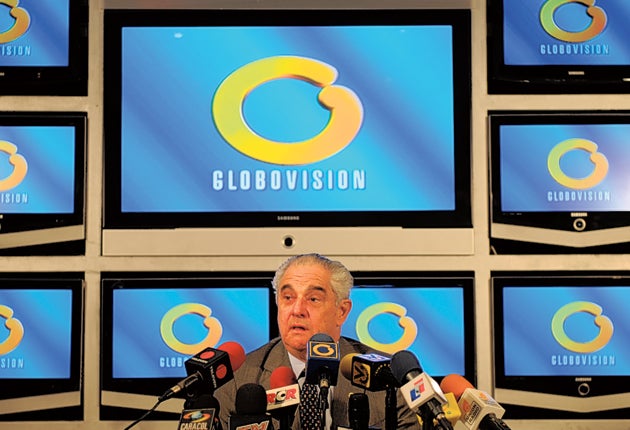UN attacks Chavez for bid to arrest head of TV network

Your support helps us to tell the story
From reproductive rights to climate change to Big Tech, The Independent is on the ground when the story is developing. Whether it's investigating the financials of Elon Musk's pro-Trump PAC or producing our latest documentary, 'The A Word', which shines a light on the American women fighting for reproductive rights, we know how important it is to parse out the facts from the messaging.
At such a critical moment in US history, we need reporters on the ground. Your donation allows us to keep sending journalists to speak to both sides of the story.
The Independent is trusted by Americans across the entire political spectrum. And unlike many other quality news outlets, we choose not to lock Americans out of our reporting and analysis with paywalls. We believe quality journalism should be available to everyone, paid for by those who can afford it.
Your support makes all the difference.A UN human rights investigator called on Venezuela yesterday to withdraw the arrest warrant against the head of the opposition Globovision television network, declaring that it had no right to silence critics.
Frank La Rue, UN special rapporteur on freedom of expression, said that the "harassment" of Guillermo Zuloaga was symptomatic of what he called the continuous deterioration of freedom of the press in the Latin American country.
"No government in the world has the right to silence critics or those who oppose the state with criminal proceedings," Mr La Rue said. He cited fears that the warrant was "politically motivated, aimed solely at silencing Zuloaga".
Mr Zuloaga is a fugitive after the attorney general issued an arrest warrant charging him with usury last week. An arrest warrant was also issued for his son, Guillermo Zuloaga Siso, according to Mr La Rue, who called for it to be lifted as well.
"This is not the first time that staff members of Globovision, including Mr Zuloaga, are criminally prosecuted because of the exercise of their right to freedom of expression," said Mr La Rue, an independent expert from Guatemala who reports to the United Nations Human Rights Council.
On Monday, the government took control of Banco Federal, which is owned by another Globovision director and handles its payroll, citing liquidity problems and risk of fraud, and leaving the station's employees in fear for their livelihoods.
President Hugo Chavez suggested on Wednesday that he might take control of shares in Globovision television station – the last major broadcaster in the Opec member to have kept up its staunchly anti-Chavez stance.
Critics say President Chavez is taking Venezuela down an increasingly authoritarian route, stifling dissent and nationalising much of the economy. Supporters say he is the victim of propaganda and a US-led campaign of vilification.
Known for its partisan coverage, Globovision has been an important platform for political opponents of Mr Chavez, who has substantially increased the number of pro-government newspapers and broadcasters since he took power 11 years ago.
Mr La Rue reiterated a request, made in 2003 and again in 2009, for an invitation from Mr Chavez's administration to visit Venezuela to make an in-depth assessment of the state of freedoms of expression and the press. "This request regrettably remains unanswered," he said.
Join our commenting forum
Join thought-provoking conversations, follow other Independent readers and see their replies
Comments